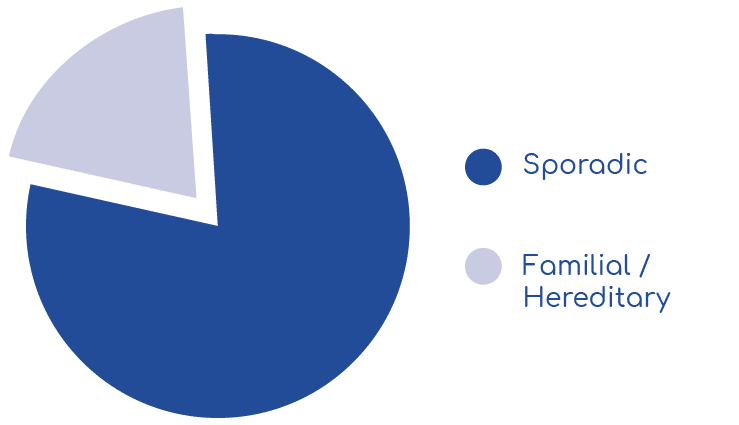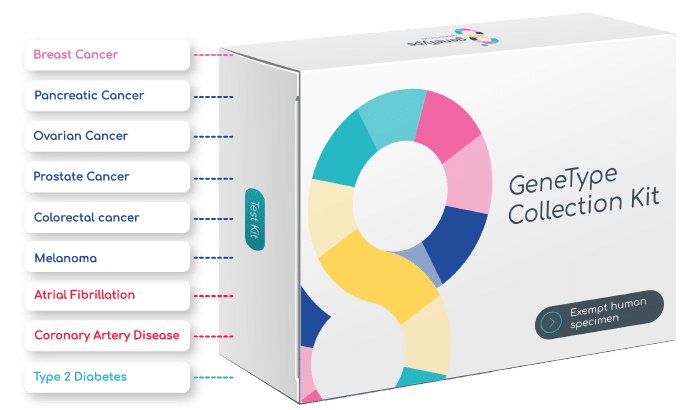Family history may not be enough to predict his risk of colorectal cancer ¹
The geneType for Colorectal Cancer risk score is a personalised – and actionable – risk prediction so you can better identify those at-risk adults. From compliance to increased surveillance, geneType can help.
Know their risk. Reduce their risk.


Most people with colorectal cancer have no significant family history ¹
Despite these stats, there is still a focus on family history risk.¹
How will you help the 70% of patients with actionable risk of colorectal cancer who also have no family history?
Colorectal cancer is on the rise in adults under 50 years²
GeneType identifies asymptomatic, healthy adults who may be at higher risk of colorectal cancer.
Colorectal cancer incidence is on the rise in adults under 50.2,3
Screening guidelines have tried to address this issue by lowering national screening recommendations to age 45 years.²
Patients are already stratified by family history, race/ethnicity, inflammatory bowel disease and obesity to assist with tailoring screening options.²
Take risk stratification one step further by understanding your patient’s “baseline” risk with geneType.
*If your patient shows symptoms associated with CRC, do not use a risk assessment like geneType.

Australia has the highest incident rate of colorectal cancer compared to any other Western country.4
What action can you take?
- Identify adults in your practice that would benefit from screening earlier than the recommended National Bowel Screening program starting age
- Let geneType help you with your bowel screening compliance rates; if your patient understands their risk, they may be more likely to screen
- Identify adults that should be having colonoscopies in addition to FOBT. Having a colonoscopy can significantly reduce risk through the removal of polyps.

The geneType Patient
GeneType for Colorectal Cancer is appropriate for:
- Men and women
- Age 30 – 85 years
- Not a carrier of a known hereditary cancer syndrome (i.e. Lynch or FAP)

GeneType testing is simple

Step 1
Register as a provider; our team will provide clinical education and other resources as needed.
geneType will send kits to your clinic to have on hand.

Step 2
Discuss geneType with your patient.
Would geneType help them qualify for additional risk reduction strategies?

Step 3
Complete the Test Requisition form, collect a sample from the patient in the buccal swabs provided and return both to geneType.
You will have the option to use a paper requisition, or a secure, compliant portal to complete the ordering process.

Step 4
Leave the rest to us.
geneType will notify you when your patient’s results are ready.
You will have the option to request a consult with a genetic counsellor, whether to review your patient’s results and/or to follow-up with your patient, as needed.
One report.
Actionable insights.
GeneType reports are structured to make the results easy to interpret and communicate to a patient.
The geneType for Colorectal Cancer report includes:
- A snapshot of your patient’s 10-year and lifetime-risk scores
- interpretation of what their risk scores mean in the context of current guidelines
- polygenic risk score indicating your patient’s “baseline” colorectal cancer risk
- information about modifiable colorectal cancer risk factors
- and the types of screening and risk-reduction interventions available to your patient
Do you have questions?
We have answers.
If your question is not shown here, please contact us directly.
Should I test a patient with no family history of CRC?
Yes.
Most people diagnosed with CRC do not have a first degree relative affected by colorectal cancer.1,2
GeneType for Colorectal Cancer incorporates polygenic risk to deliver a baseline understanding of your patient’s risk of CRC.
My patients receive an FOBT kit in the mail at 50, how would my patients benefit from geneType?
While GeneType is not a replacement for current FOBT recommendations:
- It can provide benefit by identifying patients that could benefit from an FOBT/FIT or colonoscopy even earlier than 50.
- It can be a motivating tool for your patient population that is not compliant with recommendations. We provide your patient a view of their baseline CRC risk which can be then modified based on the risk-reducing actions they decide to act on.
- It can open up the door to risk-reducing medications, such as low-dose aspirin which is shown to reduce risk by 40%.4
Is geneType for Colorectal Cancer a blood test?
No.
GeneType for Colorectal Cancer is a DNA-based risk assessment collected with a saliva tube.
What are DNA markers?
“DNA markers” is a simple term we use to describe small differences in DNA between individuals.
GeneType for Colorectal Cancer looks at DNA markers that have been scientifically proven to be associated with colorectal cancer through genome wide association studies and then cross-validated in our own lab.
What is a polygenic risk score?
A polygenic risk score is calculated by combining the effects of multiple DNA markers. While one or two DNA markers don’t have a strong influence on risk, many markers together can have a large impact. Your patient’s polygenic risk score adds up the effects of many DNA markers.
Is this test reimbursed by insurance?
This test is not generally covered by insurance. Your ordering healthcare provider will discuss the cost of the test with you. A credit card authorization form will be included in the test kit that lists the payment options. You may use your FSA/HSA to pay for the test.

*Patient eligibility dependent on personal medical history, age and sex
Interested in ordering more than one disease? Order geneType Multi-Test.
See individual disease pages for more information about each test.
The Multi-Risk suite of tests is for adults 40-85 years of age. At maximum, a woman would be eligible for 8 diseases in the panel; a man would be eligible for 7. Starting at age 30, a patient may qualify for geneType's cancer risk assessments only.
Are you ready to get started with geneType?
The first step is to trial geneType at your practice.
Blog posts
GeneType Multi-Risk assessments tailored to your needs
It’s not always easy to know what questions to ask your Doctor. Here are some breast cancer risk questions…
Cancer Is One Of Life’s Unwelcome Milestones
Difficult life milestones like cancer diagnosis Defined literally, a milestone refers to "stone or...
Can Diet Impact Your Risk of Developing Colorectal Cancer?
Yes! A big contribution to colorectal cancer risk includes lifestyle habits like smoking, alcohol consumption, and diet…
References
- Gafni A et al. PLoS One 2021;16(9):e0251469.
- Cancer Council Australia; Bowel cancer screening recommendations. Accessed population screening public feedback May 2023.
- Cancers 2022, 14(2), 275; https://doi.org/10.3390/cancers14020275
- Global Cancer Observatory (iarc.fr) Colorectal cancer incidence data by country. Accessed May 2023
- Bowel Cancer Australia. Non-modifiable risk factors. Accessed November 2021.
- Cancer Australia. Bowel cancer. Accessed November 2021.
- RACGP – Colorectal cancer. Accessed May 2023
Keep up-to-date with our latest advances
Sign up to our newsletter to stay informed about our latest advances and how these could support your practice.








